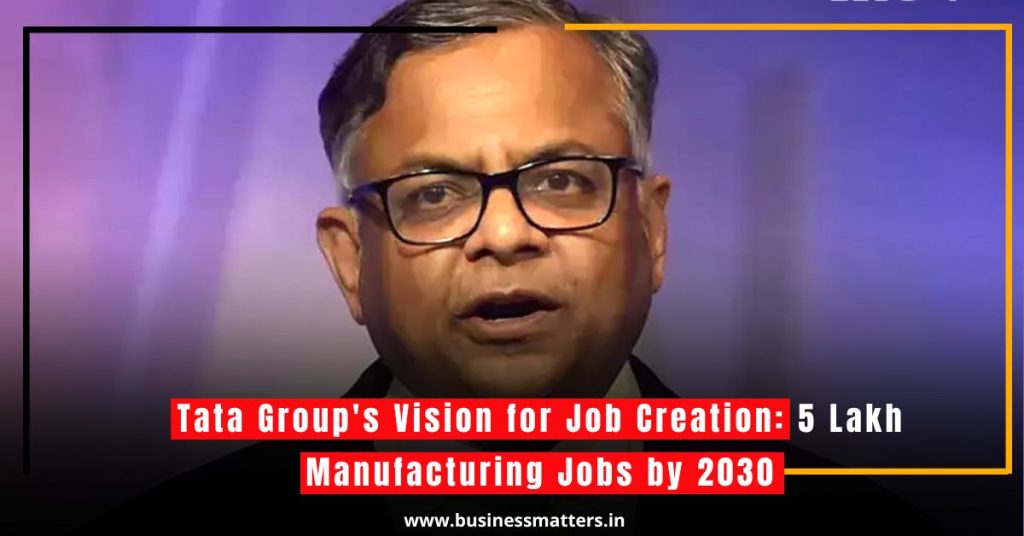Tata Group’s Vision for Job Creation: 5 Lakh Manufacturing Jobs by 2030
In a bold move aimed at strengthening India’s manufacturing sector, Tata Sons chairman N. Chandrasekaran has revealed an ambitious plan to generate five lakh manufacturing jobs across several high-tech industries by 2030. This vision, outlined in his annual letter to employees, underscores the Tata Group’s commitment to advancing India’s position as a global hub for critical industries, including batteries, semiconductors, electric vehicles (EVs), and solar equipment.
The Growth of Key Industries
Chandrasekaran’s letter highlights the Tata Group’s focus on creating new manufacturing facilities to cater to industries that are poised to play a pivotal role in shaping the future of India’s economy. The next five years will see substantial investments across various sectors. Batteries, a core component of the electric vehicle revolution, will be a key area of focus. As India moves towards a greener and more sustainable future, demand for advanced energy storage solutions, such as lithium-ion batteries, is expected to soar. This will not only help in driving the EV industry but also boost clean energy projects that rely on efficient energy storage.
Read Also:- Amagi’s Financial Performance in FY24: Strong Revenue Growth and Improved Margins
The semiconductor industry, which is vital for the functioning of modern electronic devices, is another critical sector where the Tata Group plans significant investments. With the global chip shortage causing disruptions across industries, having a robust semiconductor manufacturing ecosystem in India has become more important than ever. Tata Group aims to help reduce the dependency on imports and promote domestic semiconductor manufacturing, thus ensuring self-sufficiency in one of the most vital sectors for the future.
Electric vehicles are another area where Tata Group sees vast potential for job creation. With the rise in demand for eco-friendly transportation solutions, the group is set to scale up EV manufacturing. This move aligns with India’s broader goals of reducing carbon emissions and adopting clean energy alternatives. Tata Motors, a subsidiary of Tata Group, has already made strides in the EV sector, and its ongoing investments in electric vehicle production are expected to create thousands of new jobs in manufacturing, R&D, and related fields.
Moreover, solar energy is another sector poised for rapid expansion. India is increasingly focusing on solar energy as part of its commitment to renewable energy. Tata Group’s investments in solar equipment manufacturing are aimed at tapping into this growing market. Solar panels, inverters, and other essential components will be produced locally, driving India’s energy independence and contributing to the global transition to renewable energy.
The Impact of Job Creation
The creation of five lakh jobs is a strategic move that will not only stimulate the economy but also provide a massive boost to India’s manufacturing capabilities. These jobs will span across various skill levels, from factory workers to highly skilled engineers and technicians, providing employment opportunities to a wide spectrum of the workforce. The Tata Group’s investments will help upskill the labor force, create a highly trained workforce, and contribute to the overall development of the country’s industrial infrastructure.
Additionally, Tata Group’s focus on expanding the services sector through retail, tech services, and hospitality further complements its vision for a comprehensive job creation strategy. These industries are expected to grow rapidly in the coming years, providing thousands of service-related jobs to Indians across urban and rural areas.
Conclusion
Tata Group’s vision for job creation through investments in critical industries is a major step forward in realizing India’s potential as a manufacturing powerhouse. The development of industries like batteries, semiconductors, electric vehicles, and solar equipment will not only strengthen the nation’s economy but also create new avenues for employment. With Tata Group leading the charge, India is well-positioned to become a global leader in these high-growth sectors, driving both economic growth and sustainable development. By 2030, the group’s efforts are expected to significantly impact India’s job market, contributing to the country’s progress on the global stage.


